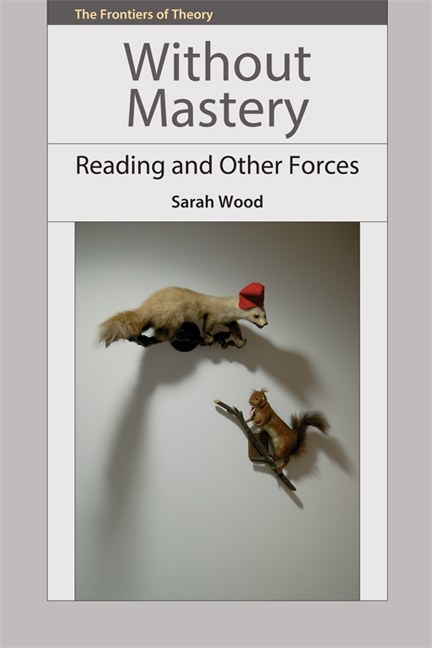Book contents
- Frontmatter
- Contents
- Series Editor's Preface
- Acknowledgements
- Epigraph
- Through the Reader
- Inventing the Reader
- Try Thinking As If Perhaps
- A Mere Instinctive Deconstruction
- Close to the Earth
- Beyond Me Nowhere But This Earth
- Edit
- Reading Matters
- Some Thing, Some One, Some Ghost (About the Fires of Writing)
- Nightshift
- Too Late To Begin?
- Notes
- Index
A Mere Instinctive Deconstruction
Published online by Cambridge University Press: 05 August 2016
- Frontmatter
- Contents
- Series Editor's Preface
- Acknowledgements
- Epigraph
- Through the Reader
- Inventing the Reader
- Try Thinking As If Perhaps
- A Mere Instinctive Deconstruction
- Close to the Earth
- Beyond Me Nowhere But This Earth
- Edit
- Reading Matters
- Some Thing, Some One, Some Ghost (About the Fires of Writing)
- Nightshift
- Too Late To Begin?
- Notes
- Index
Summary
I do what I do not say, almost, I never say what I do.
(Derrida, Glas)I am against licence. I am for austerity. And for severity. For severity. And therefore the difficulty today, which is obviously yours, is to free the powers of transformation, of transgression, is it not, without losing severity.
(Derrida, ‘Bâtons rompus’)These epigraphs concern the relation between freedom and necessity. My question is still: how to be free to read, write, think, do what must be done? The first epigraph is from Glas and has the form of enantiosis, which is as we have seen a form of irony in which one expresses an idea by the negation of its contrary, or by substituting its contrary for it. ‘I do what I do not say, almost, I never say what I do.’ A sentence like that is a severe incitement to read. At that point in Glas, it is as if the text were speaking, which is of course impossible but at times necessary, especially when there is division and conflict, as in the final interview Derrida gave, called in French ‘I am at war with myself’. It is as if the text were at war with itself. Perhaps it is gl itself speaking, the Gl of Glas, the insistent pre-verbal formation of letters which, or rather whom, Hélène Cixous has identified as one of the great characters of world literature. Whoever it is, it reminds us that a text never does what it says, that a text never opens up at the first try, it doesn't offer itself to you on a tray. And if it does, saying to you: ‘Eat, drink, swallow my letter’, what do you do then? ‘Almost’, the sentence scrupulously qualifies. ‘Never’, it adds. It laughs at those who like to think they can bargain with Necessity.
The second epigraph is Derrida speaking in 2003: ‘I am against licence. I am for austerity. And for severity. For severity. And therefore the difficulty today, which is obviously yours, is to free the powers of transformation, of transgression, is it not, without losing severity.’ Part of the difficulty is that necessity may be universal but the goddess Ananke does not show herself as such.
- Type
- Chapter
- Information
- Without MasteryReading and Other Forces, pp. 42 - 52Publisher: Edinburgh University PressPrint publication year: 2014



